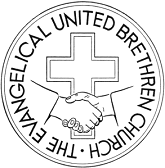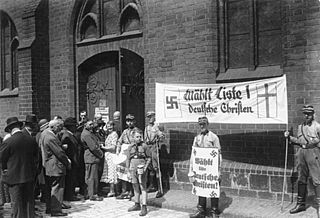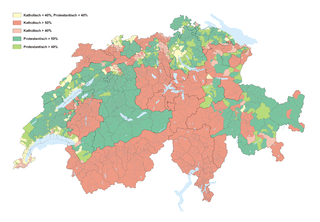Related Research Articles

A synod is a council of a church, usually convened to decide an issue of doctrine, administration or application. The word synod comes from the Greek: σύνοδος [ˈsinoðos] meaning "assembly" or "meeting" and is analogous with the Latin word concilium meaning "council". Originally, synods were meetings of bishops, and the word is still used in that sense in Catholicism, Oriental Orthodoxy and Eastern Orthodoxy. In modern usage, the word often refers to the governing body of a particular church, whether its members are meeting or not. It is also sometimes used to refer to a church that is governed by a synod.
The Confessing Church was a movement within German Protestantism during Nazi Germany that arose in opposition to government-sponsored efforts to unify all Protestant churches into a single pro-Nazi Protestant Reich Church.

The Evangelical Church in Germany is a federation of twenty Lutheran, Reformed (Calvinist) and United Protestant regional churches and denominations in Germany, which collectively encompasses the vast majority of Protestants in that country. In 2018, the EKD had a membership of 21,141,000 members, or 25.5% of the German population. It constitutes one of the largest national Protestant bodies in the world. Church offices managing the federation are located in Hannover-Herrenhausen, Lower Saxony. Many of its members consider themselves Lutherans.

The Evangelical United Brethren Church (EUB) was a North American Protestant church from 1946 to 1968. It was formed by the merger of the Evangelical Church and the Church of the United Brethren in Christ. The United Brethren and the Evangelical Association had considered merging off and on since the early 19th century because of their common emphasis on holiness and evangelism and their common German heritage. In 1968, the United States section of the EUB merged with the Methodist Church to form the United Methodist Church, while the Canadian section joined the United Church of Canada.

The United Church of Christ (UCC) is a mainline Protestant Christian denomination based in the United States, with historical confessional roots in the Congregational, Reformed, and Lutheran traditions, and with approximately 4,882 churches and 824,866 members. The United Church of Christ is a historical continuation of the General Council of Congregational Christian churches founded under the influence of New England Pilgrims and Puritans. Moreover, it also subsumed the third largest Reformed group in the country, the German Reformed. The Evangelical and Reformed Church and the General Council of the Congregational Christian Churches united in 1957 to form the UCC. These two denominations, which were themselves the result of earlier unions, had their roots in Congregational, Lutheran, Evangelical, and Reformed denominations. At the end of 2014, the UCC's 5,116 congregations claimed 979,239 members, primarily in the U.S. In 2015, Pew Research estimated that 0.4 percent, or 1 million adult adherents, of the U.S. population self-identify with the United Church of Christ.

The Evangelical Covenant Church (ECC) is a Radical Pietistic denomination in the evangelical Christian tradition. The denomination has more than 875 congregations and an average worship attendance of 280,000 people in the United States and Canada with ministries on five continents. Founded in 1885 by Swedish immigrants, the church is now one of the most rapidly growing and multi-ethnic denominations in North America. Historically Lutheran in theology and background, it is now a broadly evangelical movement.

The International Lutheran Council is a worldwide association of confessional Lutheran denominations. It is to be distinguished from the Lutheran World Federation and the Confessional Evangelical Lutheran Conference. The member church bodies of the ILC are not required to be in church-fellowship with one another, though many of them are. The organization was constituted in 1993 at a council held in Antigua, Guatemala, although it traces its roots back to theological conferences held in many locations during the 1950s and 1960s.

German Christians was a pressure group and a movement within the German Evangelical Church that existed between 1932 and 1945, aligned towards the antisemitic, racist and Führerprinzip ideological principles of Nazism with the goal to align German Protestantism as a whole towards those principles. Their advocacy of these principles led to a schism within 23 of the initially 28 regional church bodies (Landeskirchen) in Germany and the attendant foundation of the opposing Confessing Church in 1934.

The German Evangelical Church was a successor to the German Evangelical Church Confederation from 1933 until 1945.

The Prussian Union of Churches was a major Protestant church body which emerged in 1817 from a series of decrees by Frederick William III of Prussia that united both Lutheran and Reformed denominations in Prussia. Although not the first of its kind, the Prussian Union was the first to occur in a major German state.

The Reformed branch of Protestantism in Switzerland was started in Zürich by Huldrych Zwingli and spread within a few years to Basel, Bern, St. Gallen,(Joachim Vadian), to cities in southern Germany and via Alsace to France.

Lutheranism is present on all inhabited continents with an estimated 80 million adherents, out of which 74.2 million are affiliated with the Lutheran World Federation. A major movement that first began the Reformation, it constitutes one of the largest Protestant branches claiming around 80 million out of 920 million Protestants. The Lutheran World Federation brings together the vast majority of Lutherans. Apart from it, there are also other organisations such as the International Lutheran Council and the Confessional Evangelical Lutheran Conference, as well as multiple independent Lutheran denominations.

Margot Käßmann is a Lutheran theologian, who was Landesbischöfin (bishop) of the Evangelical-Lutheran Church of Hanover in Germany. On October 28, 2009, she was elected to lead the Evangelical Church in Germany, a federation of Protestant church bodies in Germany. She stepped down from both offices on February 24, 2010 following a drunk-driving incident. After serving as an "Reformation Ambassador" for the 500th anniversary of Reformation, she retired in 2018.

The German Evangelical Church Assembly is an assembly of lay members of the Evangelical Church in Germany, that organises biannual events of faith, culture and political discussion. It sees itself as a free movement of people brought together by their Christian faith and engagement in the future of the Evangelical Church and wider society. The assembly partakes in bible study, lectures, and discussions, and also hosts concerts.
The Evangelical Church of North America (ECNA) is a Wesleyan-Holiness, Protestant Christian denomination headquartered in Clackamas, Oregon. As of 2000, the Church had 12,475 members in 133 local churches. The Church sponsors missionaries in seven countries.
In Germany and Switzerland, a Landeskirche is the church of a region. The term usually refers to Protestant churches, but—in case of Switzerland—also Roman Catholic dioceses. They originated as the national churches of the independent states, States of Germany (Länder) or Cantons of Switzerland, that later unified to form modern Germany or modern Switzerland, respectively.
The German Evangelical Church Confederation was a formal federation of 28 regional Protestant churches (Landeskirchen) of Lutheran, Reformed or United Protestant administration or confession. It existed during the Weimar Republic from 1922 until being replaced by the German Evangelical Church in 1933. It was a predecessor body to the Evangelical Church in Germany.
The Protestant Reformed Church of Alsace and Lorraine is a Reformed denomination in Alsace and Northeastern Lorraine, France. As a church body it enjoys the status as an établissement public du culte.

The Swiss Reformed Church is the Reformed branch of Protestantism in Switzerland started in Zürich in 1519 by Huldrych Zwingli (1484–1531). It spread within a few years to Basel, Bern, St. Gallen, to cities in southern Germany and via Alsace to France.
References
- 1 2 3
